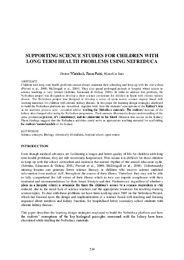Supporting science studies for children with long term health problems using nefreduca

View/
Date
2010Author
Whitelock, DenisePintó, Roser
Saez, Marcel.la
Publisher
University of CyprusPlace of publication
CY - ΛευκωσίαSource
CBLIS Conference Proceedings 2010 Application of new technologies in science and educationGoogle Scholar check
Keyword(s):
Metadata
Show full item recordAbstract
Children with long term health problems cannot always maintain their schooling and keep up with the curriculum (Prevatt et al., 2000; McDougall et al., 2004). They also spend prolonged periods in hospital where access to science teaching is very limited (Sobrino, Lizasoain & Ochoa, 2001). In order to address this problem, the Nefreduca project was designed to develop a short science curriculum for children in Spain with chronic kidney disease. The Nefreduca project was designed to develop a series of open source science inquiry based web learning materials for children with chronic kidney disease. In this paper the learning design strategies employed to build the Nefreduca platform are described , together with how the students’ conceptions of the Kidney’s role in the nutrition process were extended whilst trialling the Nefreduca materials. The students’ notions of the kidney also changed after using the Nefreduca programme. Their answers illustrated a deeper understanding of the urine production process, it’s constituency; and its connection to the blood filtration that occurs in the kidney. These findings suggest that the Nefreduca activities could serve as appropriate teaching material for scaffolding the students’ mental models of the kidney.
